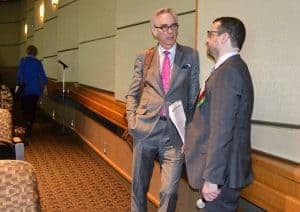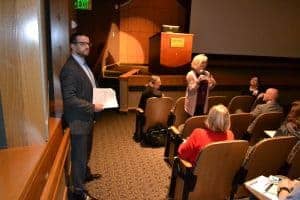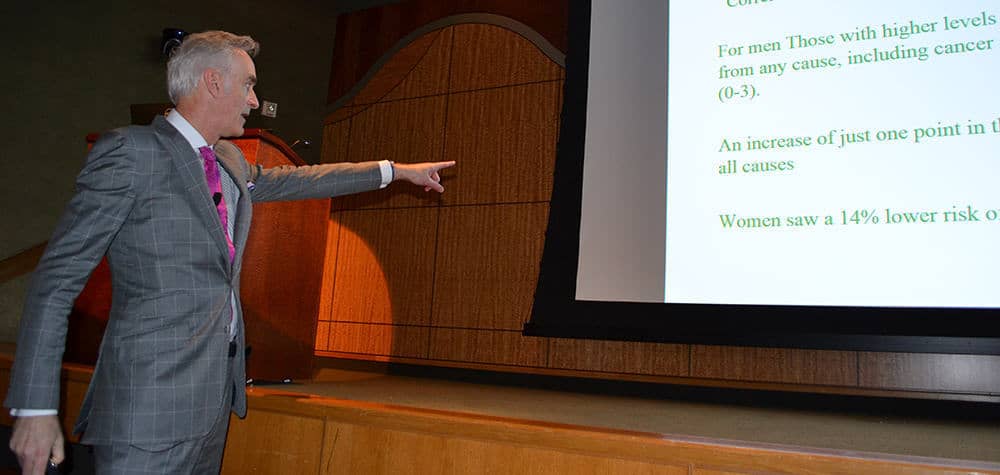Update Provides Latest Innovations, Best Practices for Diabetes
| April 20, 2018 | Even just a few small changes in diet — peanuts instead of peanut butter and crackers — can have a profound, positive effect on a person’s health, including someone with diabetes, a guest speaker told the audience April 6 at the 23rd annual UAMS Diabetes Update Symposium.

Harlan visits with Peter Goulden, M.D., during a break in the symposium schedule.
Presented by the UAMS Office of Continuing Education and co-sponsored by the Arkansas Department of Health, the Diabetes Update provides interprofessional continuing education to providers involved in all aspects of diabetes care.
About 100 attended the symposium. They listened to presentations and panel discussions and saw simulations about a variety of best practices in diabetes care along with information about the latest research findings. Topics included hearing and balance disorders associated with diabetes, diabetes prevention and new therapies, nutrition, exercise, lipids, blood pressure and technology like insulin pumps and continuous glucose monitors.
Guest speaker Timothy Harlan, M.D., spoke about culinary medicine and the treatment of obesity. He is the associate dean for clinical services at Tulane University School of Medicine in New Orleans and executive director of the Goldring Center for Culinary Medicine
“I don’t want you to think I think weight loss is unimportant, but what never gets discussed is the quality of the calories that we put in our mouths,” Harlan said. “We turn to the Mediterranean diet literature. That’s because the preponderance of the very good quality, peer-reviewed tier-one, tier-two literature is on the Mediterranean diet. About 7,000 really good quality studies have been done. It’s pretty profound.”

Using a microphone, Jan Wall, center, answers audience questions. The session was moderated by Goulden, left.
Harlan said the first researchers to look at nutrition and food culture in the countries ringing the Mediterranean Sea and the health of the populations in them noticed people there had much lower rates of diabetes, hypertension and heart disease than in the United States.
One study of people who had had heart attacks discovered that a group eating a Mediterranean-style diet saw a 50-70 percent reduction in the number of the group experiencing a second heart attack, he said. The diet also greatly improved long-term blood sugar levels in patients in another study.
Several studies also have shown that whether on a low-carbohydrate diet to lose weight or a low-fat diet, a person typically loses about 7 percent of their weight and gradually gains it back. It’s important that people not only eat healthier but do it throughout their lives. Too much emphasis on calories and weight loss and being too restrictive might result in a style of food consumption few people can maintain, Harlan said.
“We do want our patients eating much less land animal protein and much more seafood and plant-based protein,” Harlan said. “The other reason we selected the Mediterranean diet is because it allows us to meet our patients where they live.”
Eating a Mediterranean diet doesn’t have to mean lots of olive oil and Greek salad, he said. It’s about the food itself and the nutrition from it. The Mediterranean diet focuses on the quality of the calories consumed by emphasizing fruits and vegetables, legumes, whole grains and fish.
Using the results of studies of the Mediterranean diet, clinicians at Tulane have developed a nine-point system to encourage healthier eating in a sustained way without weight loss as a primary goal, Harlan said. Through the Goldring Center, medical students also learn healthier ways of cooking so they in turn can teach it in cooking classes to members of communities in New Orleans.
More than 4,000 medical students from around the country have been trained in healthy cooking and nutrition at the Goldring Center, along with 1,700 medical students from Tulane. The program has been licensed to 39 medical schools, including Northwest Arkansas Community College for teaching to their students in the college’s nursing and culinary programs.
“We teach the med students, and they teach the community,” Harlan said. “They are the force-multiplier. It’s pretty magical.”

